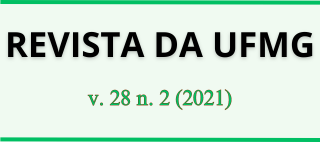Reminiscences of the Future in the Past
a historical analysis of hypothetical futures in dystopias and classic science fictions of the 20th century
DOI:
https://doi.org/10.35699/2316-770X.2021.33521Keywords:
Speculative Fiction, Historical Narratives, MemoryAbstract
The following article addresses historical questions over the twentieth century, through an analysis of speculative fictions published in this century. In that way, it’s approached a more specific definition of this literary genre, done by a dialogue with sci-fi literary works and classic dystopias from the past century. With the support of elements from Theory of History, we try to analyze the past through the lens of authors as Margaret Atwood, Ursula Le Guin, Anthony Burgess, which imagined and transcribed about a future or realities who are, at the same time, close and far away from their time. Therefore, the summary objective of the paper is to try to comprehend social and cultural questions of the Past, within the image of feasible Futures, products of their own time.
Downloads
References
ATWOOD, Margaret. O Conto da Aia. Rio De Janeiro: Rocco, 2017.
AUERBACH, Erich. Mimesis. São Paulo: Editora da Universidade de São Paulo, 1971.
BENTIVOGLIO, Julio. Distopia, Literatura & História. Espírito Santo: Editora Milfontes, 2017.
BLOCH, Marc. A história, os homens e o tempo. In: Apologia da história. Rio de Janeiro: Zahar, 2001, p. 51-68.
BURGESS, Anthony. Laranja Mecânica: edição especial de 50 anos. São Paulo: Editora ALEPH, 2012.
CASTRO, Sandra de Pádua. O imaginário na construção da realidade e do texto ficcional. Txt: Leituras Transdisciplinares de Telas e Textos, [S.l.], v. 3, n. 5, p. 53-60, jun. 2007. ISSN 1809-8150. Disponível em: <http://www.periodicos.letras.ufmg.br/index.php/txt/article/view/9565>. Acesso em: 18 abr. 2021. doi:http://dx.doi.org/10.17851/1809-8150.3.5.53-60.
CHARBEL, Felipe. O Historiador face à ficção. In: BELCHIOR, Luna, MEDEIROS, Bruno, PEREIRA, Mateus, RANGEL, Maroelo, SOUZA, Francisco. Teoria e Historiografia: Debates contemporâneos. [S.L.]: Paco Editorial, 2015. p.19-37.
CHARTIER, R. A História ou a Leitura do Tempo. Belo Horizonte: Autêntica, 2007.
COSTA, V., A PERTINÊNCIA DO IRREAL: RECONHECENDO FACES INEXPLORADAS NA FICÇÃO ESPECULATIVA. Revista Letras, Curitiba, n. 62, p. 81-95. jan./abr. 2004. Editora UFPR
ERNESTO, Luciene. ARQUÉTIPOS AFROFUTURISTAS: AS NOVAS GEOGRAFIAS DA PRESENÇA AFRODIASPÓRICA POR NEGR@S NA FICÇÃO ESPECULATIVA. In: SIMPÓSIO INTERNACIONAL LAVITS, 6, 2019, Salvador. Anais [...]. Bahia: UFBA, 2019. p. 1-14.
FANON, Frantz. Pele negra máscaras brancas. Salvador: EDUFBA, 2008.
FILHO, Altino José Martins. ENTRE O VISÍVEL E O INVISÍVEL: REFLEXÕES ACERCA DE UM ADMIRÁVEL MUNDO NOVO. Grupo Organizações & Democracia, nº 4, 2003. p.97-115. Disponível em: <https://revistas.marilia.unesp.br/index.php/orgdemo/article/view/433>.
FRANK, Priscilla. Realismo mágico, história da África e ficção cientifica: conheça o Afrofuturismo. Geledés, 2016. Disponível em: <https://www.geledes.org.br/realismo-magico-historia-da-africa-e-ficcao-cientifica-conheca-o-afrofuturismo/#ixzz4F6zLBVTE>. Acesso em: 26 abr. 2021.
HILÁRIO, Leomir Cardoso. Teoria crítica e literatura: A distopia como ferramenta de análise radical da modernidade. Anu. Lit., Florianópolis, v.18, n. 2, p. 201-215, 2013.
HUXLEY, Aldous. Admirável Mundo Novo. São Paulo: Biblioteca Azul, 2014.
LE GUIN, Ursula K. A Mão Esquerda da Escuridão. [S.L.]: Editora ALEPH, 2019.
LE GUIN, Ursula K. Is Gender Necessary?. In The Language of the Night: Essays on Fantasy and Science Fiction. Nova York: HarperCollins Publishers, 1992. 160.
LE GUIN, Ursula K. On Fantasy and Science Fiction. In: The Language of the Night: Essays on Fantasy and Science Fiction. EUA: Harper Perennial, 1993. p. 27-122.
LIMA, Paula. A Representação da Mulher em o Conto da Aia: A influência da cultura patriarcal na percepção da mulher. Monografia (Trabalho de Conclusão de Curso), Universidade de Brasília. Brasília, 2017.
MAZAMA, Ama. A afrocentricidade como um novo paradigma. In: Nascimento, Elisa Larkin (org.). Afrocentricidade: uma abordagem epistemológica inovadora. São Paulo: Selo Negro, 2009.
MENEZES, Paulo. Laranja Mecânica: violência ou violação? Tempo Social; Rev. Sociol. USP, S. Paulo, 9(2): 53-77, outubro de 1997.
NOLETTO, Israel A. C.; COSTA, Margareth Torres de Alencar. Nadsat - The Language of Violence: from Novel to Film. Ilha Desterro, Florianópolis , v. 70, n. 1, p. 257-264, Apr. 2017 . Disponível em: http://www.scielo.br/scielo.php?script=sci_arttext&pid=S2175-80262017000100257&lng=en&nrm=iso.
OZIEWICZ, Marek. Speculative Fiction. Oxford Research Encyclopedias: Literature. 29 de mar. de 2017. Disponível em: https://doi.org/10.1093/acrefore/9780190201098.013.78>. Acesso em: 31/03/2021
PEDRO, Joana Maria. Traduzindo o debate: o uso da categoria gênero na pesquisa histórica. História. São Paulo, v.24, n.1, p. 77-98, 2005.
PESAVENTO, Sandra J. História & História Cultural, 3º ed. Belo Horizonte: Autêntica, 2012.
PORQUE devemos ler a estrela da ficção científica Octavia E. Butler?. Ayana Jamieson e Moya Bailey. [s.l.]: TEDTalk, 2019. Vídeo On-line.
RüSCHE, Ana. Utopia, feminismo e resignação em The left hand of darkness e The handmaid 's tale. 2015. Tese (Doutorado em Estudos Lingüísticos e Literários em Inglês) - Faculdade de Filosofia, Letras e Ciências Humanas, Universidade de São Paulo, São Paulo, 2015. doi:10.11606/T.8.2015.tde-09092015-164853. Acesso em: 2021-04-23.
SANTOS, Ana Carolina Clemente dos; AMORIM NETO, Thomaz Pereira de; GOES, Andréa Carla de Souza. Ficção científica e o Admirável mundo novo: previsões concretizadas no atual século e considerações bioéticas. Hist. cienc. saude-Manguinhos, Rio de Janeiro , v. 20, n. 2, p. 653-674, June 2013 . Disponível em: from <http://www.scielo.br/scielo.php?script=sci_arttext&pid=S0104-59702013000200653&lng=en&nrm=iso>. Acessado em: 26 Abr. 2021.
SILVA, Kellen; QUADRADO, Jaqueline. O AFROFUTURISMO COMO FORMA DE REPRESENTAÇÃO CULTURAL. In: Encontro Missioneiro de Estudos Interdisciplinares em Cultura, 2, 2016, São Luiz Gonzaga. Anais [...]. Rio Grande do Sul: URI, 2016. p. 1-11.
SMILLIE, Tuesday. Radical Imagination And The Left Hand of Darkness. In: Ada: A Journal of Gender, New Media, and Technology, Nº. 12. [S.L], 2017. Disponível em: https://doi.org/10.13016/M2W37KX2H
TURIN, Rodrigo. A Polifonia do tempo: ficção, trauma e aceleração no Brasil contemporâneo. In: ArtCultura, Uberlândia, v. 19, n. 35, p. 55-70, jul.-dez. 2017.
WOLFGANG, Iser. Os atos de fingir ou o que é fictício no texto ficcional. In: LIMA, Luiz Costa (org.). Teoria da literatura em suas fontes, vol.2, 3ªed. Rio de Janeiro: Civilização Brasileira, 2002.p.957-985




